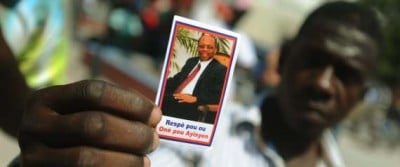Haiti: The US Supports the Curtailing of Democracy – Stop the Political Persecution of Aristide and Fanmi Lavalas
Aristide must be allowed to participate in politics without fear and intimidation

In March of 2011 I accompanied Haitian president Jean-Bertrand Aristide on his trip home to Haiti following years of forced exile in South Africa. I did so in support of Haitian democracy and Aristide’s civil rights, and in protest against my country’s role in illegally removing him from power in 2004 and then preventing him from returning to his native land for seven long years. Today, Haitian democracy and the rights of Aristide are again under threat and the U.S. government appears to be turning a blind eye.
Since returning to Haiti, Aristide has focused his energy on rebuilding and reactivating a medical university that he founded in 2001 and that had been closed down during his time in exile. Though he hasn’t been directly involved in politics, he remains a popular figure and is the leader of Fanmi Lavalas (FL) – a political party that has won the majority of votes in every election in which it has participated. However, FL has been kept off the ballot by Haiti’s authorities ever since the 2004 coup that led to Aristide’s forced exile.
Haiti’s parliamentary elections, originally scheduled for 2011, are now three years overdue and the UN and other foreign entities have repeatedly called for them to take place before the end of the year. With Aristide back in Haiti it would appear to be more difficult this time around for the government to prevent FL from participating. This is perhaps why the deposed president is once again under attack.
Last month, a Haitian judge reportedly issued an arrest warrant for Aristide. The case being mounted against him reeks of political persecution directly tied to efforts to suppress a popular alternative to the current administration of Michel Martelly, who is supported by conservative Haitian elites and the U.S.
The charges against Aristide stem from an investigation conducted by the illegal government established by the 2004 U.S.-backed coup. Under that government, human rights researchers found that some 4,000 people were killed for political reasons, while many others were imprisoned on bogus charges. Despite his powerful enemies’ best efforts, and a grand jury investigation in the U.S., no evidence has been produced that could support criminal charges against Aristide. In the meantime, the persecution of Lavalas and human rights defenders continues. On August 20, Lavalas activist Clifford Charles was killed following a protest demanding the release of fellow activist Louima Louis Juste.
The judge who issued the warrant for Aristide’s arrest has been disbarred from practicing law for 10 years – as soon as he steps down from his position as judge – for his role in the arrest last year of Andre Michel, an attorney investigating corruption within the Martelly administration. Lawyers for Aristide contend that they never received the initial summons from the judge and that when they did go to the court at the required time, the judge himself was a no-show. Now, in an apparent attempt at saving-face, the judge has ordered house arrest for Aristide, something that is not even legal in Haiti. The National Network for the Defense of Human Rights, Haiti’s most prominent human rights organization, has pointed out that these are not the actions of a neutral third-party.
On the night of September 11th, Haitian authorities went a step further, removing the security detail that had been with Aristide since his return from exile, a move that put him, his family, and his supporters at risk. Haitian press reports indicate that the command came not from the National Police, who have been reluctant to act against Aristide, but straight from the National Palace. The message was chilling and clear: the government can and will stop offering protection to the former president whenever it chooses to do so.
Is the government scared of facing Fanmi Lavalas in a free and fair election? President Martelly was elected in 2011, but only after intervention by the U.S. and its key partners, who arbitrarily overturned the results of the first round, thereby putting Martelly into the run-off election. Voter participation barely reached 20 percent.
The U.S. government was one of the main funders of those flawed elections and a major funder of the elections of 2006 and 2009, all of which excluded Fanmi Lavalas. The U.S. is also expected to provide key funding for the next elections, if and when they end up taking place. If elections aren’t held by the end of the year, terms will expire for the majority of the senate and the entire chamber of deputies, effectively letting the president rule by decree. My country’s government is a de facto, if not active supporter of this rampant curtailing of democracy.
It’s time to end the campaign of attacks against Aristide and Fanmi Lavalas once and for all. Aristide, like all Haitian citizens, must be allowed to participate in politics without fear and intimidation being the norm. My government has been complicit in undermining Haitian democracy for many years now – from the 1991 CIA-backed coup against the first Lavalas administration to the U.S. Administration’s last-ditch effort to prevent Aristide from returning to Haiti in 2011.
This needs to change. The U.S. government should stand by its professed support for democracy and development and stop standing in the way of the popular will of the Haitian people.
Danny Glover is an actor, producer and humanitarian activist.

